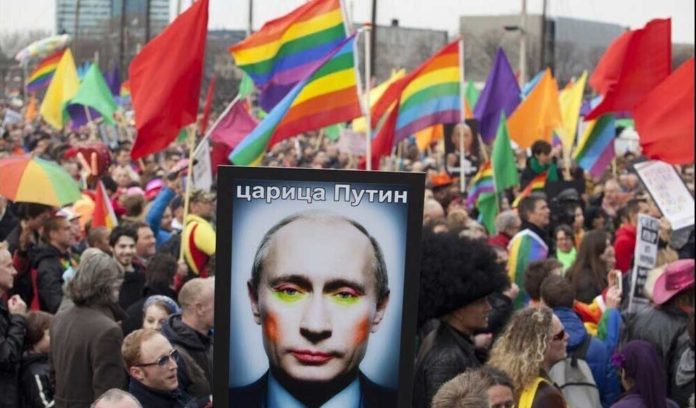Russian voters back referendum banning same-sex marriage
Two-thirds of Russian voters have backed a national referendum to ban same-sex marriage. The referendum, which has the weight of a constitutional amendment, defines marriage as between one man and one woman. The week-long voting ended July 2.
Alphonso David, president of the Human Rights Campaign (HRC), said Russian President Vladimir Putin is a “threat to the human rights of all.”
In a statement, David said, “Russia is tripling down on its attacks on the basic human rights and dignity of LGBTQ people by adding constitutional prohibitions against marriage equality.”
David also said, “Putin and his administration used propaganda brochures leading up to the election promising a return to ‘traditional family values,’ using marriage between loving couples as a wedge to push through his nefarious agenda. It is shameful, manipulative and malicious.”
This is yet another repressive action against LGBT people in Russia under the Putin government. In 2013 President Putin pushed for a federal law criminalizing any materials distributed to minors, including safe-sex pamphlets, that detailed information about same-sex relationships. In the months after passage of the so-called “gay propaganda” law, the Human Rights Watch (HRW) reported that anti-gay hate crimes had increased significantly.
The issue was raised anew in advance of the Sochi Olympics in February 2014 when Putin warned against any “homosexual propaganda” or “homosexual athletes” at the Games who might corrupt Russian youth.
All Pride events were banned in Russia in 2018. At a press conference last week Putin made homophoobic references to a Pride flag at the American embassy in Moscow. He said the flag “revealed something about the people that work there,” according to Reuters, implying that the embassy personnel were gay.
The Trump administration banned the flying of Pride flags from all embassies in June 2019. But Ambassador John Sullivan began flying the flag from a window on June 25 — the day the voting on the Russian referendum began.
In a video on Instagram, Sullivan, a Republican Trump appointee, said the flag was a statement of solidarity. “LGBTI rights are human rights, and human rights are universal,” Sullivan said. “It’s as simple as that.”
Anti-gay violence has been widely reported throughout Russia in recent years, and in Chechnya there have been extremes of state-sponsored violence against gay people. A new HBO documentary “Welcome to Chechnya” details the virulently homophobic attacks.
City Officials Outraged Over Swastikas Painted on Parisian Gay Bars
While about 2,000 people marched in Paris on July 4 for LGBT Pride, two area gay bars were defaced with Nazi graffiti. On July 6 Boris Jamet-Fournier tweeted a photo of Paris gay bar Café Cox, which had swastikas painted on the windows. Jamet-Fournier said he “saw the marks of hatred” on the bar. He said “Discovering these tags on a beautiful summer morning is a reminder that the fight against intolerance must NEVER cease.”
Café Cox tweeted out thanks to the city for its swift response, saying, “We will fearlessly resist this violence. We thank the town hall of Paris for its solidarity and for having acted quickly to erase these ignoble signs of hatred.”
But the incident at Cox was not the only such hate vandalism.
On July 3 Jean-Luc Romero-Michel, a long-time Parisian LGBTQ and AIDS activist, tweeted similar photos of swastikas painted on a different Paris queer bar, Banana Café.
In his tweet, Romero-Michel said, “Paris is an inclusive city and, as [Mayor] Anne Hidalgo reminds us often, will never accept hatred and LGBTQI-phobes.”
The owners of the two bars decried the actions and said that the gay community was clearly being targeted.
Mayor Hidalgo condemned the violence, tweeting images of the vandalism and asserting, “These messages of hate and homophobia don’t have a place in Paris. I hope that those responsible will be quickly identified and brought to justice.”
Egyptian LGBT activist dies by suicide in Canada
An Egyptian LGBT activist was found dead in her home in Canada where she had been living in exile since 2018.
Sarah Hegazi, 30, killed herself on June 13. She left a note asking her family and friends to forgive her.
“To my siblings: I tried to find redemption and failed, forgive me,” Hegazi’s handwritten letter said. “To my friends: the journey was harsh and I am too weak to resist it, forgive me. To the world: you were cruel, to a great extent, but I forgive.”
Hegazi raised the rainbow flag at a concert in Egypt in October 2017 and was among dozens arrested by Egyptian security forces for the action. She was charged with “promoting sexual deviancy and debauchery.”
Hegazi spent three months jailed at Sayeda Zeinab police station where male agents incited inmates to beat and to verbally and sexually assault her. She was gagged with a cloth with her hands cuffed and subjected to electric shock until she lost consciousness.
Hegazi experienced anxiety, panic attacks and PTSD she suffered as a result of her incarceration. Fearful of being arrested again, Hegazi sought asylum in Canada.
Hegazi was laid to rest in a rainbow-colored casket following a public funeral. Activists around the world paid virtual tribute to her online, including during Global Pride on June 28.
The LGBTQ+ community is considered a national security threat by the Egyptian government, religious authorities and all political parties.

